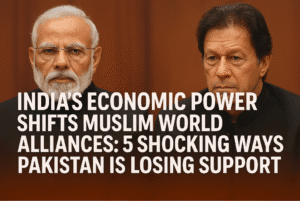India’s Economic Power Shifts Muslim World Alliances: 5 Shocking Ways Pakistan Is Losing Support
Following the 2025 Pahalgam terror attack, Muslim-majority nations have prioritized economic and strategic interests over ideological alliances in responding to India-Pakistan tensions. Gulf states like Saudi Arabia, the UAE, and Qatar—once staunch Pakistan allies—adopted muted stances, driven by India’s role as a critical trade partner ($85 billion UAE-India trade), energy buyer, and labor hub. Iran proposed mediation, balancing historic ties with Pakistan against its Chabahar Port investments with India, while Turkey tempered its pro-Pakistan rhetoric to safeguard $10 billion bilateral trade.
This pragmatic shift mirrors reactions to India’s 2019 Kashmir policy changes, where Gulf nations labeled it a “domestic issue.” Pakistan’s waning influence highlights a broader trend: developing nations, facing post-pandemic economic pressures, now favor stability and growth over religious diplomacy, leaving India strategically fortified and Pakistan increasingly isolated in a transactional geopolitical landscape.

India’s Economic Power Shifts Muslim World Alliances: 5 Shocking Ways Pakistan Is Losing Support
The April 2025 Pahalgam terror attack, which claimed 26 lives in Indian-administered Kashmir, has reignited long-standing tensions between India and Pakistan. Yet, unlike past crises where religious solidarity often influenced diplomatic stances, the Muslim world’s reaction today reveals a striking prioritization of economic and geopolitical interests over ideological alliances. Here’s a deeper look at the undercurrents shaping these dynamics.
The Gulf’s Silent Calculus: Trade Trumps Tradition
Saudi Arabia, the UAE, and Qatar—once vocal supporters of Pakistan—have adopted muted responses to the crisis. Their restraint underscores a seismic shift in foreign policy priorities:
- Saudi Arabia’s Vision 2030: Riyadh’s silence reflects its reliance on India for labor, energy exports, and investment diversification. Bilateral trade surged to $52 billion in 2024, with Saudi Aramco investing $15 billion in Indian refineries. The kingdom’s balancing act—maintaining ties with Pakistan while deepening economic bonds with India—mirrors its pragmatic pivot under Crown Prince Mohammed bin Salman.
- UAE’s Strategic Neutrality: With $85 billion in annual trade (2024), India is the UAE’s second-largest trading partner. Abu Dhabi’s criticism of India’s Indus Waters Treaty suspension was tempered by its mediation role in Gulf-Iran tensions and reliance on Indian expatriates, who constitute 30% of its population.
- Qatar’s Post-Blockade Priorities: Focused on economic recovery, Qatar has avoided overt alignment. Its $20 billion LNG deals with India and investments in Indian tech startups highlight a shift from ideological posturing to transactional diplomacy.
Why It Matters: Gulf states now view India as indispensable to their economic futures, reducing incentives to back Pakistan unconditionally.
Iran and Turkey: Diplomatic Tightropes
- Iran’s Mediation Bid: Tehran proposed dialogue, positioning itself as a neutral mediator. This contrasts with its historical pro-Pakistan stance, driven by its need to counterbalance U.S.-Saudi influence and secure Indian investments in Chabahar Port, a key trade corridor.
- Turkey’s Constrained Rhetoric: While Ankara traditionally champions Kashmir at multilateral forums, its $10 billion trade with India (2024) and energy partnerships have softened its tone. President Erdoğan’s call for “dialogue” signals a bid to avoid alienating either side.
The Subtext: Both nations face internal economic crises, making antagonizing India—a critical trade partner—a costly proposition.
The Article 370 Precedent: A Blueprint for Pragmatism
The Muslim world’s tepid response echoes its reaction to India’s 2019 revocation of Jammu and Kashmir’s autonomy. Back then, Saudi Arabia and the UAE termed it an “internal matter,” while Oman blocked a Pakistan-led OIC condemnation. Today, this pragmatism has deepened:
- Pakistan’s Diminishing Leverage: Declining Gulf investments in Pakistan (down 40% since 2020) and India’s rise as a global power have recalibrated regional loyalties.
- China’s Shadow: While Beijing remains Pakistan’s staunchest ally, Gulf nations are wary of over-reliance on China, opting instead for diversified partnerships.
Implications: A New Era of Geopolitical Realism
- India’s Diplomatic Gains: PM Modi’s proactive outreach—energy pacts with Riyadh, defense ties with Abu Dhabi—has paid dividends, insulating India from collective Muslim world pressure.
- Pakistan’s Isolation: Islamabad’s reliance on “Islamic solidarity” now appears outdated, pushing it closer to China and Turkey, albeit with limited economic returns.
- Global South Alignment: Developing nations increasingly prioritize economic resilience over ideological blocs, a trend accelerated by post-pandemic recovery needs.
You must be logged in to post a comment.